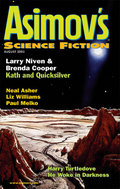
| Editor: | Sheila Williams |
| Issue: | Volume 29, No. 8 |
| ISSN: | 1065-2698 |
| Pages: | 144 |
Another excellent set of reviews, this time from Peter Heck. I was also fascinated by Robert Silverberg's column this month on Robert Burton's The Anatomy of Melancholy, which looks like one of those books that I'll never read but which I like reading about. Lots of letters this month rather than another column, which was a bit disappointing (the columns in Asimov's are one of the best parts).
The stories this month were mostly eh, with two stand-outs that I enjoyed a great deal.
"He Woke in Darkness" by Harry Turtledove: Oh, look, a story about the US South where the whites are oppressed and the blacks are in charge and racist. Gee, I've never seen anything like that before. Yawn. The whole thing gains some sort of point from the somewhat predictable ending, and the writing isn't bad, but really, isn't this overdone by now? It wasn't that compelling of an idea in the first place. (5)
"Softly Spoke the Gabbleduck" by Neal Asher: A rather generic adventure story of exploration on an alien planet inhabited by strange creatures, where most of the danger comes from one's fellow human beings. One of the creatures is suitably amusing and provides a good climax, but the story is otherwise not memorable. Not an objectionable way to pass the time, but nothing worth searching out either. (6)
"A Shadow Over the Land" by Liz Williams: Williams's short stories seem to move so slowly to me. Once the story starts, it's an okay take on feelings of the land, perhaps a bit too mysterious but evoking a nice sense of place. It just takes so long to get there, and there's so much description that for me didn't help with the setting. (5)
"Point of Origin" by Catherine Wells: This is a great arson investigation story. It's mostly a police procedural except with forest fires (already an excellent story hook), and the future technology is blended in subtly but still significantly. The result is character-focused and character-driven, captures the terror of a forest fire quite well, and still has enough technology fun to appeal to the science fiction fan. It also fits its length quite well. (7)
"Bottom Feeding" by Tim Pratt: Part tall tale and part psychological study, this story never quite worked for me. I wanted it to, and I kept thinking it would come together, but even with the twist ending there was a bit too much emotional wallowing enabled by a mysterious catfish and not enough sense of wonder for me. (6)
"The Summer of the Seven" by Paul Melko: The best story of the issue, this one deals with genetically modified humans who are the sole remaining inhabitants of Earth after a technological singularity. They've been modified to form tight-knit groups that communicate via a form of telepathy mediated by advanced scent pads and pheremone detectors. The story is told from the perspective of one member of an adolescent pod, a viewpoint that works extremely well. The plot isn't hugely important, and is mostly a good excuse to explore the ethics and problems of pod-structured humanity, but that exploration is quite satisfying. (8)
"A Birth" by Carrie Richerson: You wouldn't guess it from the start of this story, but it ended up being mostly a story of alien history and contact. The entire story was basically exposition. It's not uninteresting exposition, but I think I would have preferred a bit more story. (6)
"Kath and Quicksilver" by Larry Niven & Brenda Cooper: Adolescent adventure stories in which the character spends much of the story being stupid and the reader just has to endure the inevitable train wreck are not one of my favorite techniques. Combine that with a protagonist who, apart from a few stupid decisions, is led around by the nose for the whole story and has her problems solved by various magical friends, and you get a rather disappointing result. This is despite a nicely imagined future Mercury and well-handled technology bits that would have made a great background for a better story. (6)
Reviewed: 2005-12-11